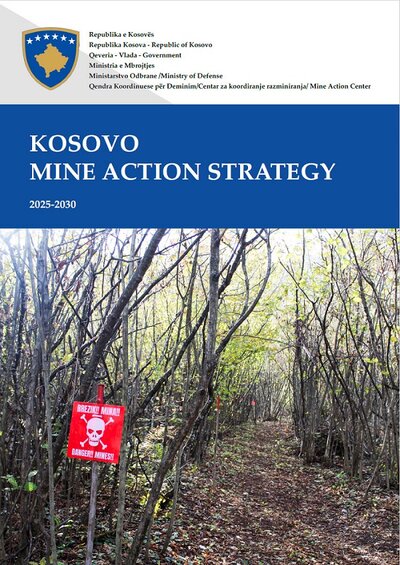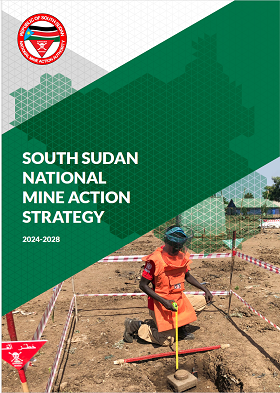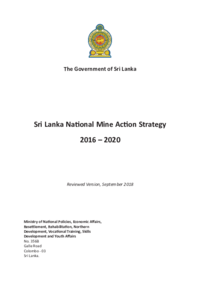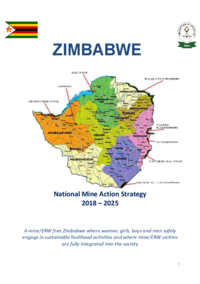Strategic Planning in Mine Action
Mine action takes place in conflict or post-conflict contexts by a range of national and international governmental and non-governmental actors. The process of developing, implementing and reviewing national mine action strategies brings these stakeholders together, to clarify needs and priorities, and identify opportunities and risks. National strategies that are context-specific, evidence-based and realistic allow affected countries and their partners to communicate consistently around priorities, make informed decisions, allocate resources, and prioritise activities. This helps maximise the impact of mine action efforts and minimise the risks to communities affected by explosive ordnance.
Inclusive strategic planning processes allow explosive ordnance-affected countries to tap into unique partner expertise and integrate diverse needs, perspectives, and priorities into their national mine action strategies.
Working closely with national authorities and local partners, the GICHD’s strategic planning support contributes to sustainable mine action programmes that are aligned with the needs and priorities of the affected governments and the communities they serve. Engaging relevant ministries further facilitates mine action’s integration with broader sectors and alignment with priorities in national-level plans and strategies.
The GICHD’s strategic planning support to affected and donor countries generally spans several years, focusing on strategy development, implementation, and review. Experience from several countries shows that strategic planning processes are valuable in and of themselves by bringing stakeholders together to discuss challenges and identify solutions, promoting a greater understanding among partners and willingness to collaborate.
By adopting an all-inclusive approach to mine action, strategic planning processes also emphasise the connections between different thematic areas. The GICHD’s experience shows that a greater understanding of how these areas connect often results in strengthened collaboration and information sharing between different units and organisations. GICHD supports these processes by tapping into its in-house expertise in different thematic areas, including information management, land release, standards, gender and diversity inclusion, and explosive ordnance (EO) risk education.
In addition to supporting EO-affected countries, the GICHD also supports donor countries with developing and reviewing their mine action strategies, using a similar strategic planning process, where context analysis is key.
National Strategies Publications
The Republic of South Sudan national mine action gender equality and diversity policy
South Sudan's National Mine Action Gender and Diversity Policy has been developed with the support of the Geneva International Centre for Humanitarian Demining (GICHD), inconsultation with all relevant mine action implementing...

- Available in English
Kosovo Mine Action Strategy 2025-2030
This mine action strategy outlines the strategic orientation of the Kosovo mine action programme from 2025 to 2030, developed by the Kosovo Mine Action Center (KMAC). The strategy draws on international good practice and builds...

- Available in English
South Sudan National Mine Action Strategy 2024-2028
South Sudan’s national mine action strategy presents the strategic direction for its mine action programme for the period 2024 – 2028. Its purpose is to provide accountability, clarity, and a shared sense of strategic orientation...

- Available in English
Iraq National Mine Action Strategy 2023 - 2028
This National Mine Action Strategy presents the strategic orientation for the Republic of Iraq's mine action programme 2023-2028. It replaces the National Strategic and Executive Plan for Mine Action 2017-2021, builds on...

- Available in Arabic, English
Sri Lanka National Mine Action Completion Strategy
This National Mine Action Completion Strategy presents the strategic orientation for Sri Lanka’s mine action programme from 2023 to 2027, developed by National Mine Action Center (NMAC) with the support of the Geneva International...

- Available in English
Sri Lanka National Mine Action Strategy: 2016-2020 | Reviewed Version, September 2018
As mandated by Sri Lanka’s National Mine Acti on Strategy 2016-2020, this reviewed version is the result of the mid-term strategy review, organised and facilitated with the support of the Geneva International Centre for...

- Available in
Zimbabwe National Mine Action Strategy 2018-2025
This National Mine Action Strategy, the first of its kind in Zimbabwe, presents the overall vision, mission, goals and objectives of Zimbabwe’s mine action programme for the period 2018-2025. The strategy’s timeline corresponds to...

- Available in English
National Capacities And Residual Contamination | Albania
This case study forms part of a broader GICHD study on national capacities and residual contamination. The purpose of this report is to document Albania’s experience of developing national systems and capacities to address...

- Available in English
Prioritisation Policy, Procedures and Practices Relating to UXO Clearance in Lao PDR
This report maps the current prioritisation system in Lao PDR, including UXO policies and related development policies of the Government of Lao PDR (GOL), standard operating procedures of UXO operators, and actual prioritisation...

- Available in English
Prioritisation Policy, Procedures and Practices Relating to UXO Clearance in Lao PDR [ In Lao]
This report maps the current prioritisation system in Lao PDR, including UXO policies and related development policies of the Government of Lao PDR (GOL), standard operating procedures of UXO operators, and actual prioritisation...
![Prioritisation Policy, Procedures and Practices Relating to UXO Clearance in Lao PDR [ In Lao]](/fileadmin/_processed_/0/5/csm_csm_Lao_-_Prioritisation_report_-__2017-07-17_Lao_0004949365_c02233f73d.png)
- Available in Lao



